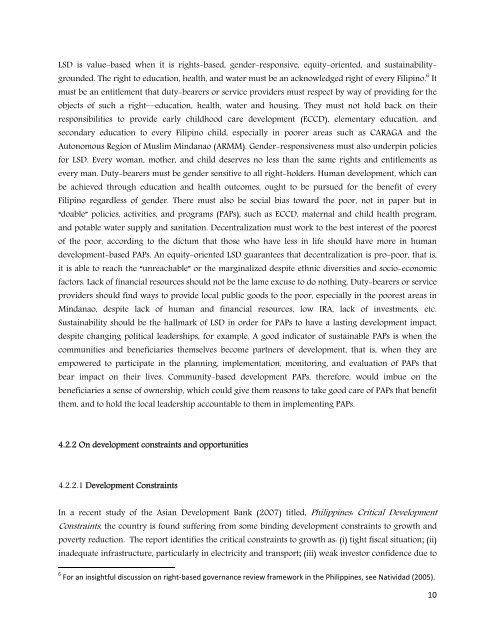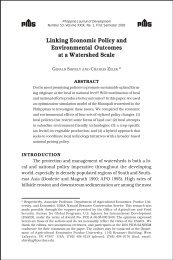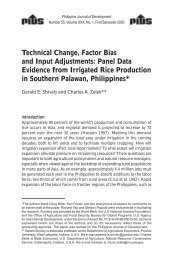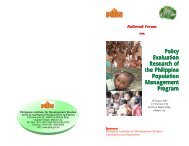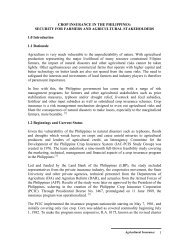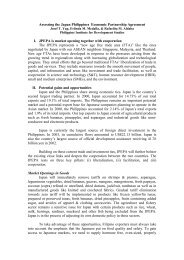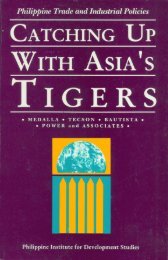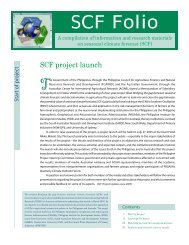Triangulation Framework for Local Service Delivery - Philippine ...
Triangulation Framework for Local Service Delivery - Philippine ...
Triangulation Framework for Local Service Delivery - Philippine ...
Create successful ePaper yourself
Turn your PDF publications into a flip-book with our unique Google optimized e-Paper software.
LSD is value-based when it is rights-based, gender-responsive, equity-oriented, and sustainabilitygrounded.<br />
The right to education, health, and water must be an acknowledged right of every Filipino. 6 It<br />
must be an entitlement that duty-bearers or service providers must respect by way of providing <strong>for</strong> the<br />
objects of such a right—education, health, water and housing. They must not hold back on their<br />
responsibilities to provide early childhood care development (ECCD), elementary education, and<br />
secondary education to every Filipino child, especially in poorer areas such as CARAGA and the<br />
Autonomous Region of Muslim Mindanao (ARMM). Gender-responsiveness must also underpin policies<br />
<strong>for</strong> LSD. Every woman, mother, and child deserves no less than the same rights and entitlements as<br />
every man. Duty-bearers must be gender sensitive to all right-holders. Human development, which can<br />
be achieved through education and health outcomes, ought to be pursued <strong>for</strong> the benefit of every<br />
Filipino regardless of gender. There must also be social bias toward the poor, not in paper but in<br />
“doable” policies, activities, and programs (PAPs), such as ECCD, maternal and child health program,<br />
and potable water supply and sanitation. Decentralization must work to the best interest of the poorest<br />
of the poor, according to the dictum that those who have less in life should have more in human<br />
development-based PAPs. An equity-oriented LSD guarantees that decentralization is pro-poor, that is,<br />
it is able to reach the “unreachable” or the marginalized despite ethnic diversities and socio-economic<br />
factors. Lack of financial resources should not be the lame excuse to do nothing. Duty-bearers or service<br />
providers should find ways to provide local public goods to the poor, especially in the poorest areas in<br />
Mindanao, despite lack of human and financial resources, low IRA, lack of investments, etc.<br />
Sustainability should be the hallmark of LSD in order <strong>for</strong> PAPs to have a lasting development impact,<br />
despite changing political leaderships, <strong>for</strong> example. A good indicator of sustainable PAPs is when the<br />
communities and beneficiaries themselves become partners of development, that is, when they are<br />
empowered to participate in the planning, implementation, monitoring, and evaluation of PAPs that<br />
bear impact on their lives. Community-based development PAPs, there<strong>for</strong>e, would imbue on the<br />
beneficiaries a sense of ownership, which could give them reasons to take good care of PAPs that benefit<br />
them, and to hold the local leadership accountable to them in implementing PAPs.<br />
4.2.2 On development constraints and opportunities<br />
4.2.2.1 Development Constraints<br />
In a recent study of the Asian Development Bank (2007) titled, <strong>Philippine</strong>s: Critical Development<br />
Constraints, the country is found suffering from some binding development constraints to growth and<br />
poverty reduction. The report identifies the critical constraints to growth as: (i) tight fiscal situation; (ii)<br />
inadequate infrastructure, particularly in electricity and transport; (iii) weak investor confidence due to<br />
6 For an insightful discussion on right‐based governance review framework in the <strong>Philippine</strong>s, see Natividad (2005).<br />
10


